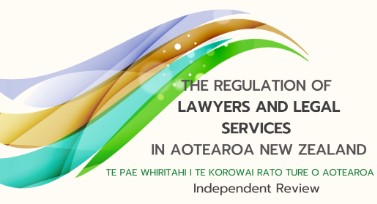Regulating Lawyers in Aotearoa New Zealand | Te Pae Whiritahi i te Korowai Rato Ture o Aotearoa
 In 2021, the Law Society commissioned an Independent Review to examine the regulation and representation of legal services in Aotearoa New Zealand, including the structure and functions of the Law Society.
In 2021, the Law Society commissioned an Independent Review to examine the regulation and representation of legal services in Aotearoa New Zealand, including the structure and functions of the Law Society.
Following 12 months of engagement, research and analysis, the report, Regulating Lawyers in Aotearoa New Zealand | Te Pae Whiritahi i te Korowai Rato Ture o Aotearoa, was released by the Law Society on 9 March 2023. The review was undertaken by a three-member Independent Review Panel (the Panel), which included Professor Ron Paterson (Chair), barrister Jane Meares, and Professor Jacinta Ruru from Otago University.
The overall conclusion of the report is that while the current regulation and representation model works well in some areas, in others it falls short.
The report makes eight key recommendations: 1
- Establish a new independent regulator to regulate lawyers in Aotearoa New Zealand.
- Ensure the independence and effectiveness of the new regulator by institutional arrangements that include:
- establishing an independent statutory body, which is not a Crown Entity and not subject to direction from Ministers
- a board of eight members, with an equal split between lawyer and public members, chaired by a public member, and at least two members with strong te ao Māori insights
- appointment of board members by the Minister of Justice, following advice from a nominations panel comprising a mix of consumer representatives, governance experts and members of the legal profession.
- Incorporate Te Tiriti and regulatory objectives in the new Act and update the fundamental obligations of lawyers, by:
- including a Tiriti o Waitangi section, requiring those exercising powers and performing functions and duties to give effect to the principles of Te Tiriti o Waitangi
- setting out regulatory objectives, with an overarching objective to protect and promote the public interest
- updating the fundamental obligations of lawyers, requiring lawyers to promote as well as protect their clients’ interests and adding a new obligation on lawyers to maintain their competence and fitness to practise.
- Reform the scope of regulation, by:
- maintaining the current focus of the regulatory framework on lawyers and conveyancers, rather than extending it to cover other unregulated legal service providers
- introducing a new ‘freelance’ practising model that allows lawyers to provide services to the public in non-reserved areas, without requiring prior approval from the regulator
- permitting employed lawyers to provide pro bono services to the public in non-reserved areas
- permitting new business structures, to allow non-lawyers to have an ownership interest in law firms and lawyers to enter into legal partnerships with non-lawyers
- directly regulating law firms, with new firm-level obligations.
- Enable the regulator to better protect consumers, support practitioners, and assure competence, by:
- giving the regulator new tools, including powers to suspend practising certificates. require practitioners to undergo a health or competence review, undertake practice, reviews and impose bespoke conditions on a practising certificate
- reviewing CPD requirements, including the current 10-hour CPD requirement, and specifying key mandatory components of CPD to be undertaken every three to five years.
- Reform the system for handling complaints about lawyers and introduce a model in which:
- complaints will be assessed and determined by in-house specialist staff, rather than by volunteers on Standards Committees
- formal investigative and disciplinary processes will be reserved for those matters that require a disciplinary response from the regulator. Complaints about ‘consumer matters’ (eg, fees, delay, poor communication) will instead go through a dispute resolution process
- the identity of a lawyer who engages in ‘unsatisfactory conduct’ will not be publicly disclosed other than in exceptional circumstances, with naming reserved for cases where the Lawyers and Conveyancers Disciplinary Tribunal finds the lawyer guilty of ‘misconduct’
- the independent Legal Complaints Review Officer will be replaced by a small review committee convened by the regulator and staffed by external members or an external adjudicator
- lawyers will be subject to a new duty to ensure complaints are dealt with promptly, fairly, and free of charge.
- Encourage diversity and inclusion in the legal profession, by:
- creating a regulator with a specific objective of “encouraging an independent, strong, diverse and effective legal profession” and a competence-based board that reflects diversity
- removing regulatory barriers that are having a discriminatory effect
- giving the regulator new powers to collect diversity data from law firms and publish
aggregate data on trends within the profession.
- The Law Society should continue as the national representative body. It should have
a single governance layer, with a board comprising 8-10 members, including public
members.
1 Executive summary,
More information about the Report






